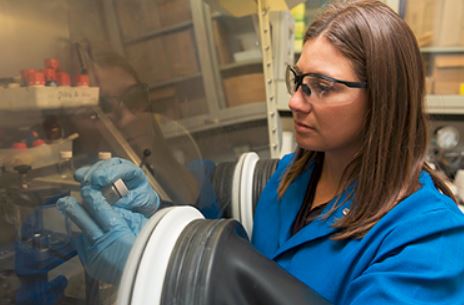Smarter Planet
How An Accidental Discovery Led to a New, Highly Recyclable Plastic
April 24, 2018 | Written by: IBM THINK Blog
Categorized: Smarter Planet
Share this post:
Sunday marked the 48th annual celebration of Earth Day, the global event that celebrates the importance of environmental protection. This year, the Earth Day Network’s focus is to, “fundamentally changing human attitude and behavior about plastics and catalyzing a significant reduction in plastic pollution.”

Jamie Garcia
IBM, Polymer Chemist, Jamie Garcia, is doing more than her fair share to help us make these changes—sometimes by accident.
During a recent project, Jamie successfully broke down polyethylene terephthalate (PET), the plastic used to make bottles, to useful, new monomers – the building blocks for plastics. Over the following days, she set up a reaction to test the viability of making new plastics with these monomers. Then, while gathering ingredients, the mixture she made hardened.
“Well, ‘hardened,’ is an understatement,” Garcia said.
She tried to grind the hardened mixture, but it wouldn’t break. “I actually had to take a hammer and break the flask to get to the plastic and figure out what I had made,” she said.

Garcia in the lab.
Garcia and her team ran experiments on the new material, using techniques including quantum mechanical computer modeling. They discovered that the new material is lightweight, stronger than bone and solvent resistant. In addition, they found that it can be recycled and reused hundreds of times, rather than the typical three of four times allowed with current plastics.
“Current plastic recycling methods degrade the material each time it’s broken down and remolded, meaning it can’t be reused for the same purpose twice,” she said. The material Garcia discovered could be used to build plastic parts, then broken back down to powder and used to build again—and again and again.
“The infrastructure doesn’t yet exist to recycle plastics chemically, and the process could be more expensive,” she said. “In the long run, it would be worth it, since we could recover more of our materials and save energy, resources and landfill space.”
Referencing Natural Capitalism: The Next Industrial Revolution, Garcia said, “‘The flow of molecules in the US economy is 99.98 percent pure waste,” and notes, “We need to change our relationship with plastics.” With her work, Garcia has shown one exciting path forward.
Making the workplace safe for employees living with HIV
The recent promising news about Covid-19 vaccines is in sharp contrast to the absence of a vaccine for HIV, despite decades of research. Unlike Covid-19 with a single viral isolate that shows minimal diversity, HIV circulates in a wide range of strains that so far have proven impervious to a single vaccine. Fortunately, more people […]
Call for Code for Racial Justice Needs You: Join the Movement
IBM has never avoided taking on big challenges. At IBM, we are privileged to drive impact at scale. We take on challenges that transform our clients, impact people’s lives and innovate for future generations as we strive to effect systematic societal change. Over the course of our 109-year history, the evidence has become clear that […]
A New Wave: Transforming Our Understanding of Ocean Health
Humans have been plying the seas throughout history. But it wasn’t until the late 19th century that we began to truly study the ocean itself. An expedition in 1872 to 1876, by the Challenger, a converted Royal Navy gunship, traveled nearly 70,000 nautical miles and catalogued over 4,000 previously unknown species, building the foundations for modern […]



